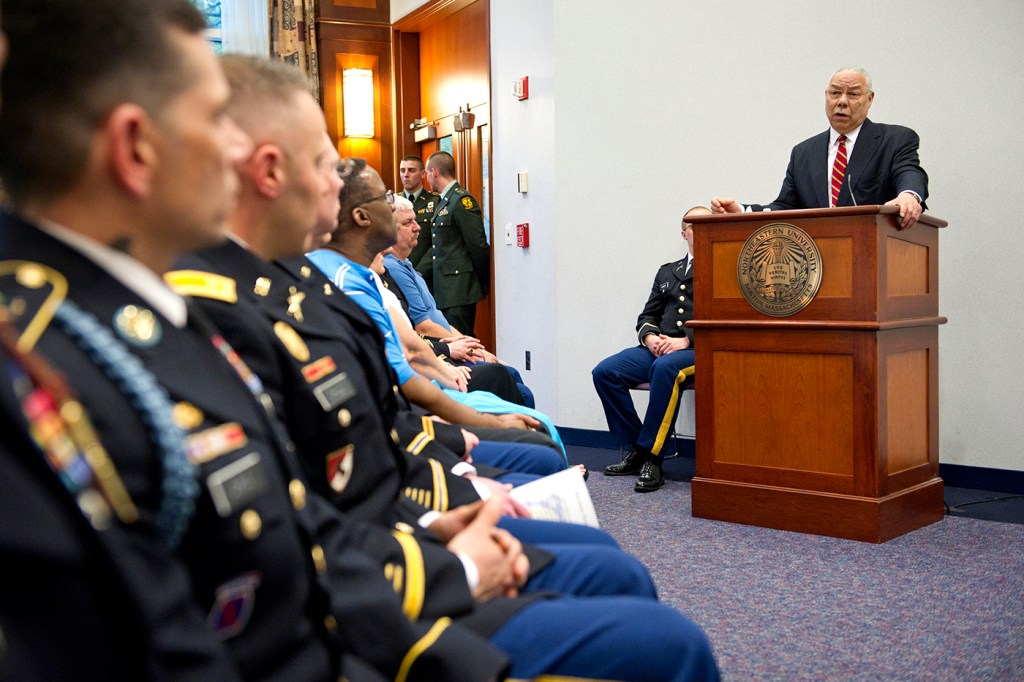Northeastern remembers Colin Powell as a transformational figure and a natural leader

Colin Powell, the soldier turned military leader and diplomat whose 2012 commencement address exhorted Northeastern graduates to make society a better place, is remembered for living his ideals by helping educate thousands of children and providing candid advice to presidents.
“His face would light up when he saw the kids,” recalled Sy Sternberg, the former chairman of Northeastern’s Board of Trustees, who knew Powell for 20 years. Sternberg served as an adviser to what is now known as the Colin Powell School for Civic and Global Leadership at the City College of New York, which both men attended.
Sternberg, a retired life insurance corporate executive, said he last saw Powell in June at the school. “He was just a class guy who cared about people.”
It was Sternberg who invited the former secretary of state to address Northeastern’s Class of 2012. Despite Powell’s accomplishments as a diplomat, at heart he was first and foremost a soldier. “He was a four-star general and liked being called that more than anything else,” Sternberg remembered.
Members of Northeastern’s community remembered Powell’s abiding significance Monday after the nation’s former top diplomat and adviser to presidents George Herbert Walker Bush and George W. Bush died at 84 years of age from complications of COVID-19.
“You look at Gen. Powell and you said, ‘Here’s an individual I trust. He’s someone that we can get behind,’” said Chris DeWitt, a Northeastern alum who, like Powell, served in the U.S. Army. DeWitt is now a veteran career adviser at Northeastern’s Dolce Center for the Advancement of Veterans and Servicemembers, where he helps students prepare for post-military careers.




DeWitt recalled Powell as a unifying figure between older Americans turned off by the U.S. involvement in Vietnam in the 1960s, and those whose pride in the armed forces swelled after the victorious first Iraq war in the 1990s.
“He was significant for my generation and even my parents’ generation,” DeWitt said.
Powell’s reputation for standing up for his beliefs won him acclaim among younger people who may not remember his military service but may recall the lifelong Republican supported Joe Biden, a Democrat, in the 2020 election against Donald Trump, said Andy McCarty, a U.S. Air Force veteran and director of the Dolce Center.
“That was really a profile in courage because the folks who do that don’t tend to fare very well right now in the current political climate,” McCarty said.
Despite the nation’s political friction, the need for people who are willing to serve the country never goes away, added DeWitt. And Northeastern’s Reserve Officers’ Training Corps program is one avenue for students to do just that.
During Powell’s visit to Northeastern in 2012, he presided over a commissioning ceremony for ROTC cadets. Northeastern Army ROTC has commissioned more than 4,000 cadets in the U.S. Army, U.S. Army Reserve, and the Army National Guard.
Powell also met with a group of Black students from the Class of 2012 and encouraged them to focus on their talents and abilities.
Powell, who was Black, recalled in his Northeastern commencement speech how the armed forces taught him how to deal with adversity, especially during racial strife.
“The Army, in those days, was the most socially progressive institution for Blacks in this country while segregation was still the law of the land,” he said. “I belonged to an institution that was only concerned about your performance and your potential.”
Education, he recalled, played a large part in his rise from humble beginnings as the son of Jamaican immigrants growing up in the Bronx to one of the nation’s most decorated military leaders. However, on his graduation from the City College of New York, he had decided to skip the ceremony to hang out with friends.
“You didn’t get to cross the stage and have your name called out so I figured my mother wouldn’t notice that I wasn’t there,” Powell told Northeastern graduates. “Mothers being mothers, she sniffed the air…she knew where I was.”
She dispatched relatives to take her son to the commencement ceremony. “She had waited a long time for that moment and was not to be denied,” Powell said to laughter.
Powell’s advice to the Class of 2012: Always have a purpose in life that is beyond position and money, and participate in public service in some capacity, be it on local school boards or in elective office.
COVID-19 wasn’t an issue when Powell graduated from university in the 1950s, but another disease―polio―was. Jonas Salk, inventor of the polio vaccine, was Powell’s commencement speaker.
“I pray that years from now, you will remember who your graduation speaker was. The name is Powell―P-o-w-e-l-l,” he said to cheers and applause. “Don’t forget it!”
For media inquiries, please contact media@northeastern.edu.




